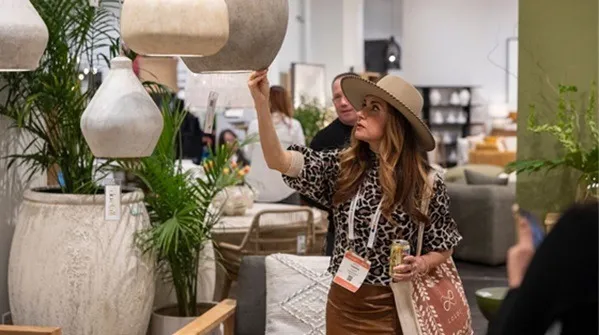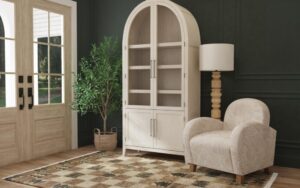
Shoppers will likely find higher prices on items due to the new tariffs.
Wholesale prices for home accents are going up.
Most manufacturers, whether in letters to customers or in media interviews, have conceded as much, due to tariffs that have already been levied or soon will be, after President Trump’s “Liberation Day” tariffs go into effect April 9.
How their retail partners — who have the task of trying to sell potentially more expensive, discretionary merchandise to an anxious, jittery public — will handle the situation varies. In a handful of interviews with Home Accents Today after the tariff increases were announced, some said they will raise prices while others said they won’t. Some are choosing to double down on what they think makes them unique and special, or investing in other areas of their business.
“We are being barraged with emails and letters from all our vendors of increases of 10% to 25%. It is honestly so disturbing while trying to sell, market and promote our lines on a daily basis,” said Ken Ludwig, an interior designer who also operates a retail store, Kenneth Ludwig Chicago. Business so far this year has been challenging, he said.
“We know they have to do this to survive, but it puts such an unsettling fear in the marketplace. The president thinks this doesn’t affect small businesses, which is 110% incorrect.”
Ludwig is increasing prices by 15% or 20% across the board on all new incoming merchandise as well as special orders for clients. “We can’t keep changing prices every week, or month, so we are going to raise the prices and see where we sit after a few months’ time,” he said.
Cheryl Clendenon, an interior designer with a retail store in Pensacola, Fla., said she will absorb smaller pricing hits “for a bit.” Brad Priest, proprietor of J&B Home Décor & Gifts in Elkhart, Ind., says he cannot and will not raise prices. He plans to call any vendor with whom he has an order or back orders and ask if a “tariff tax” will be added to the purchase total.
“Depending on their answer and how much the charge will be, will determine whether I keep or cancel the order,” he said. “I know that isn’t fair to the vendor, but I just can’t cover the tariff taxes. I am especially worried when it comes to the holiday orders that will start shipping in September.
“On a retail level, a client will only pay so much for an item,” he continued. “If I raise prices, then they simply won’t or can’t buy the item. This will affect every aspect of my business and unfortunately, the powers that are implementing these tariff taxes do not care.”
He said he will let his clients and shoppers know that he has not increased the prices of items currently in the showroom. “Now more than ever we must band together and support shopping local and save our independent businesses,” he said.
Passing on price increases is the last thing Christina Van Blake, who owns Home, a home furnishings and décor store in Dover, N.H., wants to do. But she feels she is well prepared to ride things out.
“I don’t worry about tariffs,” Van Blake said. “If it’s not one thing this year, it will be something next year. I keep a broad variety of products made in many places. One piece of upholstery may have leather from Mexico, a drop-in spring deck from China, a hardwood frame from Canada, foam from Houston and fabric from Europe.
“I stockpiled a few things in our warehouse, ordered accessories and holiday décor in advance and locked in pricing in January at the Atlanta Market. We looked for vendor specials, negotiated freight rates and combined orders with a friend who owns a similar business a state over to increase buying power.”
Made in America
The retailers who spoke with Home Accents Today said they support American-made goods but challenge the notion that domestic manufacturing will come roaring back due to tariffs on products made elsewhere.
“The falsehood that ‘this will bring all manufacturing back to the U.S.’ is simply ridiculous,” said Ludwig. “It is and will greatly hurt our made-in-America upholstery and case goods. Metal, wood, parts [will all be] affected. Nothing can be done to change that.”
“People want everything made in the U.S., but they don’t want to pay a U.S. citizen a working wage to do the work,” said Van Blake. “You can’t have it all. Made in the U.S. means jobs for U.S. citizens and a wage that supports living here. That will be reflected in the price.”
(As a sidenote, she said she loves the Amish-made case goods from Mavin, which weren’t impacted by COVID or container pricing, according to Van Blake. “And I haven’t gotten the Henny Penny ‘the sky is falling’ panic letter about increasing prices due to tariffs,” she noted.)
Clendenon, of In Detail Interiors, is working with a custom cabinetmaker to design a few case good pieces. “It won’t be a less expensive option, but people want more heirloom furnishings more than they did five years ago and this helps keep some of the money stateside,” she said.
Other priorities
Clendenon, who writes HAT’s monthly “Design Coaching Center” print column, said she is instituting a “tariff bonus” for her employees “to help them weather the personal challenges of increased pricing.”
“To me, the most important thing I can consider at this time is how to protect my biggest asset, and that is my team. So yes, it means it might cost the company in the short run to absorb some of the additional costs as they happen, and we will take steps to reduce expenses as well to help absorb the hit. It is a multi-pronged approach for seasoned business owners who have been down this path before.”
Interior designer and store owner Nancy Mikulich plans to emphasize the service aspect of her business, NLM Design Interiors and Oasis Home Designs in Asbury Park, N.J.
New products will be marked up between 10% and 15% “to keep ourselves covered,” she said. But she is developing a new contract in which her design fees and services are more important than product sales. “I believe this conveys a message of the “Value” with a capital “V” of working with us,” Mikulich said.
“A specialty of our service is to integrate a client’s existing furnishings into the updated design, and with that we believe that this now more than ever, is important.” — Anne Flynn Wear contributed to this story
See also:
What does it all mean? Industry tries to sort through new Trump tariffs
In wake of tariffs, this N.J. retailer is leaning into ‘value’
Credit: homeaccentstoday.com










